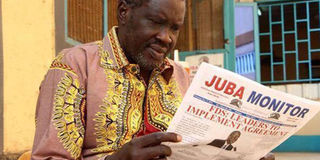South Sudanese veteran journalist dies in Uganda

South Sudan veteran journalist, Alfred Taban, has passed on
What you need to know:
Born in 1957 in Kajo-Keji County, Taban was a broadcast journalist and former BBC correspondent in the Sudanese capital Khartoum.
KAMPALA. South Sudan veteran journalist, Alfred Taban, has passed on. Taban reportedly died at Nakasero Hospital in Kampala on Saturday where he had been admitted.
Mr Odongo Odoyo, the managing director of Juba Monitor, confirmed the demise of their founder and said it was a big loss to the newspaper.
“Taban died on Saturday at 3pm at Nakasero Hospital in Kampala and his body is still there. This is a big loss to us as the media house and also journalists in South Sudan,” he said.
It is not clear what caused his death, but he had earlier suffered a stroke.
Ms Irene Ayaa, a journalist based in Juba, who worked with Taban, said the death was a big blow to South Sudan. She described Taban as a brave face of journalism in a country where media freedom is at its lowest.
“My former boss, my mentor, my friend, my dad, Taban, the veteran journalist, the most courageous man I have ever known. You have gone too soon. We haven’t finished the struggle yet. You will be remembered for your courage in defending press freedom in South Sudan, the region and the world at large. May your soul rest in peace. We mourn for you Alfred, we mourn for you.”
Mr James Mading Gol Akech, another Sudanese national, said the late exhibited the highest level of true journalism and stood by its highest standards.
“Rest in Peace great man, Taban. You fought a tough war of true journalism during our dark days in the then one Sudan. You faced several arrests and torture for the sake of exposure of realities in Khartoum which was/is still the seat of government. Your death is a big loss in our nation.”
Social media outbursts
Mr Michael Wani, a resident from Kajo Keji County, where Taban comes from, is an angry man. On his Facebook page, Mr Wani blamed Taban’s death on weak health care system and endemic corruption in the country.
“Dear Kajo Keji sons and daughters, we have failed our own son Taban. Those with little money are supporting different functions. Others take their sons and daughters to India, Germany or US but we decided to keep our own in Kampala but heavily support our political affiliation support. It is time we move beyond political affiliation to securing our own sons and daughters. Today it is Taban and you never know who is next.”
Mr Rachael Akidi, who worked with Taban, said: “I am shocked to hear of the passing of South Sudanese veteran journalist Taban. He was a mentor and inspiration to many journalists. I remember Alfred as a champion of media freedom in Sudan before the referendum that paved the way for the independence of South Sudan. He was repeatedly jailed and his Juba Monitor newspaper shut down several times by the Khartoum government of the now deposed President Bashir.”
Career
Born in 1957 in Kajo-Keji County, Taban was a broadcast journalist and former BBC correspondent in the Sudanese capital Khartoum.
He founded the Khartoum Monitor and when South Sudan got independence, he relocated to Juba and renamed the newspaper Juba Monitor and was its first Editor-in-Chief before joining politics.
He was famed as the first journalist to report on the conflict in Darfur and in 2005 won the Speaker Abbot Award.
He is also remembered for rejecting a presidential appointment to the national dialogue committee in 2017 and demanded that all jailed journalists must first be freed if he is to accept any presidential appointment.
“Yes, he ( Salva Kiir) appointed me to be a member of the Dialogue Committee but I told him to release journalist George Olivio, then I will accept the appointment,” Taban said.
At the time of his death, he had joined active politics, but remained a strong media defender.
[email protected]




